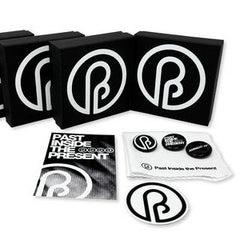John Fahey // How Bluegrass Music Destroyed My Life BOOK
- Availability:
大御所フォーク作家John Faheyによる小説です。
レーベルその他作品はこちら /// Click here to see more Drag City releases available at Tobira.
---------------------------
Review by Doug Spangle @ Portland Mercury :
"Over the past 40 years, John Fahey has, in his own words, "skyrocketed to world-wide obscurity;" How Bluegrass Music Destroyed My Life describes how he achieved this feat.
Fahey, as an early indie record producer, wrote his own liner notes, which were typically hilarious, ranty, or fantastical. Drag City's publisher avers that when he asked Fahey to send some of his musical memoirs, the guitarist obligingly dug a bunch of writings he had just thrown away out of his garbage and Fed Ex-ed them complete with stains, and that was the genesis of this book.
A large, socially awkward, profoundly odd person, Fahey took up guitar (to impress girls) as the Folk Boom hit in the '50s. He wandered into the lives of other profoundly odd people in the process of discovering Blues, Country, and other music. His unique career turns as musician and producer later influenced all sorts of troubadours from Sonic Youth to Windham Hill.
Fahey's personal oddness consists, in part, of being able to live simultaneously on several different planes of reality--the everyday as well as others where cat-people leap through the air at night and spirits appear, offering cryptic advice. At one point, he tells of a visitation of the spirit of Hank Williams. Fahey says, "Who's that? I can't quite see you." The answer comes back, "It's just Hank. Hank Williams." Fahey has a unique sensibility that turns his stories; his literary talents are nearly as ample as his musical gifts.
Growing up in the suburbs of Washington DC during and after World War II was weird for him; He tells the story of his adventures with the "Dead Dog Guy" when he was eight or nine. According to Fahey's story, the Dead Dog Guy said, "...I'm going down there with songs about dead dogs, all kinds of dead dogs, not just little black ones, Johnny, no, no just little black ones, but all kindsa dead dogs and I don't care what you think I'll show you I'm not crazy because I'm gonna make all kindsa money. And anyone who makes all kindsa money isn't crazy and I'm not crazy, I just love dead dogs, I just love dead dogs because when they're dead--THEY CAN'T BARK ANYMORE! HA! HA! HA!"
Fahey says this was Fred Rose, who wrote "Old Shep" and "Little Buddy" and "all kindsa songs about dead animals and the public loved it."
Is Fahey making this up? Who knows. The book's high point may be when he punches out Michelangelo Antonioni during the filming of Zabriskie Point, but it's hardly the only high point. Monster fish, trains, space and aliens also figure in How Bluegrass Music Destroyed My Life. And Richard Meltzer is the only other music writer I know of who can throw around references to philosophy with as much abandon as John Fahey."
***
Text via Goodreads:
"A collection of fictional but semi-autobiographical stories, this work comes from one of the most influential guitarists in music history. The tales are recalled in a conversational, feverish tone, following the musician in his childhood and young adulthood in post-World War II suburbia, pausing along the way for moments of clarity and introspection. The stories resist categorization—part memoir, part personal essay, part fiction, and part manifesto they simply stand alone, having their own logic, religious dogma, and mythological history.'
Artist : John Fahey
Label : Drag City
大御所フォーク作家John Faheyによる小説です。
レーベルその他作品はこちら /// Click here to see more Drag City releases available at Tobira.
---------------------------
Review by Doug Spangle @ Portland Mercury :
"Over the past 40 years, John Fahey has, in his own words, "skyrocketed to world-wide obscurity;" How Bluegrass Music Destroyed My Life describes how he achieved this feat.
Fahey, as an early indie record producer, wrote his own liner notes, which were typically hilarious, ranty, or fantastical. Drag City's publisher avers that when he asked Fahey to send some of his musical memoirs, the guitarist obligingly dug a bunch of writings he had just thrown away out of his garbage and Fed Ex-ed them complete with stains, and that was the genesis of this book.
A large, socially awkward, profoundly odd person, Fahey took up guitar (to impress girls) as the Folk Boom hit in the '50s. He wandered into the lives of other profoundly odd people in the process of discovering Blues, Country, and other music. His unique career turns as musician and producer later influenced all sorts of troubadours from Sonic Youth to Windham Hill.
Fahey's personal oddness consists, in part, of being able to live simultaneously on several different planes of reality--the everyday as well as others where cat-people leap through the air at night and spirits appear, offering cryptic advice. At one point, he tells of a visitation of the spirit of Hank Williams. Fahey says, "Who's that? I can't quite see you." The answer comes back, "It's just Hank. Hank Williams." Fahey has a unique sensibility that turns his stories; his literary talents are nearly as ample as his musical gifts.
Growing up in the suburbs of Washington DC during and after World War II was weird for him; He tells the story of his adventures with the "Dead Dog Guy" when he was eight or nine. According to Fahey's story, the Dead Dog Guy said, "...I'm going down there with songs about dead dogs, all kinds of dead dogs, not just little black ones, Johnny, no, no just little black ones, but all kindsa dead dogs and I don't care what you think I'll show you I'm not crazy because I'm gonna make all kindsa money. And anyone who makes all kindsa money isn't crazy and I'm not crazy, I just love dead dogs, I just love dead dogs because when they're dead--THEY CAN'T BARK ANYMORE! HA! HA! HA!"
Fahey says this was Fred Rose, who wrote "Old Shep" and "Little Buddy" and "all kindsa songs about dead animals and the public loved it."
Is Fahey making this up? Who knows. The book's high point may be when he punches out Michelangelo Antonioni during the filming of Zabriskie Point, but it's hardly the only high point. Monster fish, trains, space and aliens also figure in How Bluegrass Music Destroyed My Life. And Richard Meltzer is the only other music writer I know of who can throw around references to philosophy with as much abandon as John Fahey."
***
Text via Goodreads:
"A collection of fictional but semi-autobiographical stories, this work comes from one of the most influential guitarists in music history. The tales are recalled in a conversational, feverish tone, following the musician in his childhood and young adulthood in post-World War II suburbia, pausing along the way for moments of clarity and introspection. The stories resist categorization—part memoir, part personal essay, part fiction, and part manifesto they simply stand alone, having their own logic, religious dogma, and mythological history.'
Artist : John Fahey
Label : Drag City






